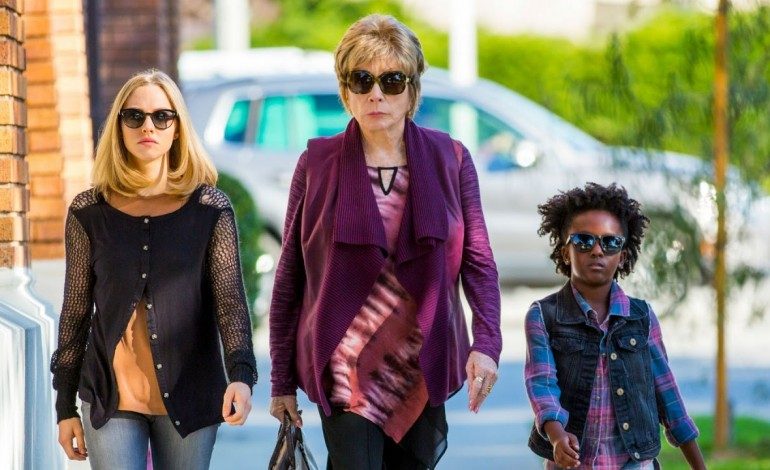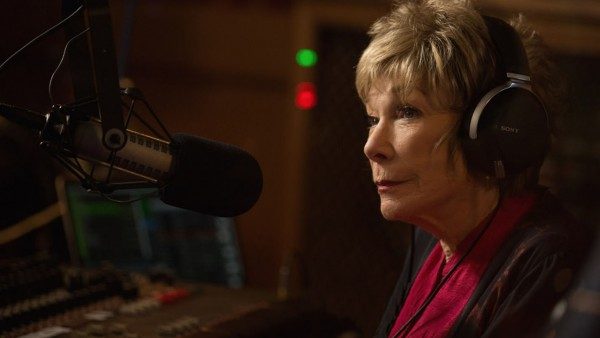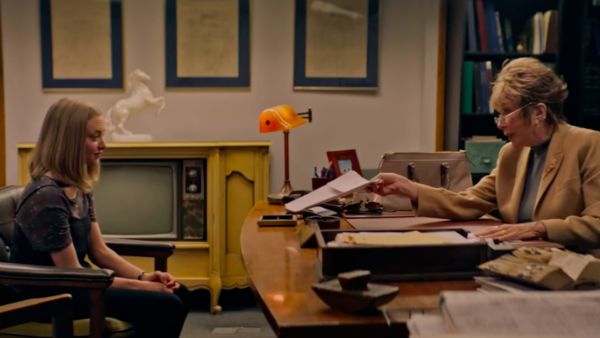

When going into a screening of a sentimental comedy with dashes of drama, one takes the experience with a grain of salt. From Bad Santa to “The Proposal, these kinds of films are expected to have the kitschy dialogue, the temporally manipulative montages and the oft necessary “grandma’s dancing to hip-hop!” scene. It almost seems like filmmakers not only have a methodical filmic approach for these kinds of films but they are stuck on a railroad track, careening through to their end-all destination of a feel-good picture.
But occasionally, there comes a movie that does not adhere to this formulaic approach and does exactly what Bertolt Brecht hated about Hollywood during his time there. The Last Word is a film that is “original but familiar, unusual but popular, moralistic but sexy, true but improbable, tender but violent, slick but highbrow.” The film exists almost as an oxymoron, operating somewhere between indie comedy and melodrama. Think “Grandma” but with a sprinkle of Little Miss Sunshine, with perhaps a spoonful of The Devil Wears Prada.
The Last Word tells the story of 82-year-old Harriet Lauler (Shirley MacLaine), a high-strung former advertising executive who has slowly morphed into the archetypical rich old curmudgeon. While financially, materialistically and hedonistically secure, Harriet is missing one thing—a purpose to live. After a failed suicide attempt involving a few Klonopins, chased by a bottle or two of wine, Harriet becomes determined to live long enough to leave behind a cherished legacy.
Enlisting the help of the feisty and free-spirited Anne (Amanda Seyfried), the local obituary writer, Harriet sets out to approve her obituary—and thus her legacy—before her death. Unfortunately, instead of being remembered amongst her friends and family as the loving mother, supportive friend and savvy businesswoman that she sees herself to be, Harriet is disappointed to discover that most consider her to be a cold, disdainful and rude woman. Well for the controlling, uptight and demanding former executive, that just won’t do.
Directed by the capable Mark Pellington with a screenplay from newcomer Stuart Ross Fink, The Last Word is a touching, albeit clichéd comedic melodrama. In typical buddy-buddy filmic fashion, the two protagonists are clearly at odds with one another from the outset. Leaning into stereotypical psychic roles, one is outspoken, brash and old while the other is young, vivacious and free-wheeling. You’d think they’d never get along! But needing to live up to narrative expectations, it’s only a matter of time before both begin seeing the admirable aspects of each other, learning to respect, love and cherish one another.
And while this peripeteia of characterization is nothing new for melodrama, other aspects of the film work to enrich the cinematic experience and make you forget you’re watching what is in many regards a copy-and-paste film. Whether it is the Fincher-inspired cinematography that exudes the form of a small, intimate drama or the masterful acting from MacLaine and focalization on mise-en-scéne, Pellington’s newest film returns to the stellar kitschy work that he made with Henry Poole is Here.
In many regards, this is a film that is hard to dislike—the editing is sharp, the camera work is admirable and Shirley MacLaine shines (particularly in her powerhouse scene with veteran actor Philip Baker Hall). But at the same time, the picture works tirelessly to ensure that you do dislike it. From the passé cinematic tropes of Anne’s relationship development (of course her first date ends in front of a lightbulb clad theater marquee) to her cheesy tear-my-speech-cards-up-and-speak-from-the-heart moment, The Last Word is intent on maintaining the formal and narrative choices that so many films before it had done.
At one point in the film, Anne explains that “the best anyone can hope for is to not be forgotten.” While it seems legacy is the driving motive behind all of Harriet’s and even Anne’s actions, all of it is undone in a matter of seconds. Towards the end of the film, Harriet brazenly orders a tow truck to tear the L (for Lauler) off of her former ad company’s parking lot sign. Why would she do that? Isn’t that contradictory to her goal of being remembered? It seems so and yet she does it anyway, ensuring that the last ounce of memory anyone would have had of her at her former agency is now gone, skidding down the road behind that hired pick-up truck.
So perhaps legacy is not so important to Harriet after all. Perhaps it is discovering that deep down, she is a good, loving and well-intentioned woman who is perhaps just a little rough around the edges. In any case, there still seems to be a juxtaposition between motive and action, one that is hard to swallow, and quite frankly a bit absurd.
Verdict: 3 out of 5
The local radio station frequently says they are “playing independent music for independent minds.” It seems that Mark Pellington’s most recent outing desperately tries to reflect this notion, attempting to create an indie comedy melodrama that is as loving as it is edgy. But all that the audience sees is a predictable dramedy that is as inviting as it is boring. Nonetheless, for all the unoriginal, derivative and banal elements of the film, “The Last Word” is a warmhearted examination of the existential crisis that people often face in their golden years.


